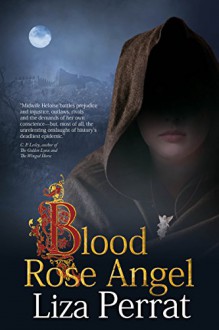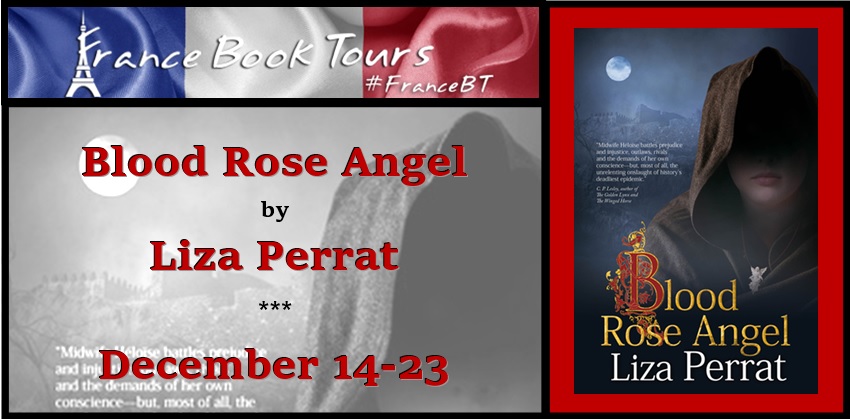
I write this review as a member of Rosie’s Book Review Team (author, check here if you are interested in getting your book reviewed) and thank her and the author for this opportunity.
This is the third novel I have read in the series The Bone Angel and the fourth novel by Liza Perrat. (You can check my reviews of Spirit of Lost Angel here, Wolfsangel here and The Silent Kookaburra here.) You might have guessed by now that I enjoy her books. Having read The Silent Kookaburra first, for quite a while I thought that was my favourite of the author’s novels (and don’t get me wrong, I enjoyed the others) but now, I’m not so sure.
We are in Lucie-sur-Vionne, France, 1348. The whole series is set in the same location and follows the characters of the female line of a family who are linked by their midwifery skills (or wish to care for others) and by the passing of a talisman, the bone angel of the title. All the women of the series feel a strange connection to this angel (whose story/legend we hear, first- hand, in this book) and to each other, although this novel is, so far, the one set further back in the past, and at a very momentous time (like all the others). The Black Death decimated a large part of the world population and this novel offers us the perspective of the people who lived through it and survived to tell the tale.
The story is narrated, mostly in the first person, by midwife Héloïse, whose birth was problematic (her mother, Ava, a midwife herself, died before she was born and her aunt, Isa, extracted her from the womb) and due to the superstitions of the time, she was shunned and taunted as a child (she was not only a bastard, as her father was unknown, but she was also ‘unborn’). She always felt guilty for her mother’s death and resisted becoming a midwife due to that. But, eventually, she heeded her calling, learned from her aunt, and has become loved and appreciated by most people (apart from a few villagers who blame her for unlucky events). Unfortunately, as human nature dictates, when the epidemic reaches the village (at the same time as her husband, a stonemason who had been working in Florence) and people start dying, everybody looks for someone to blame, be it cats, the Jews, the lepers, or… There are a few chapters told from other characters’ point of view, only to complete the picture when Heloise is otherwise engaged (I’m trying not to give any spoilers here).
Héloïse is a strong-willed woman, who struggles between trying to fulfill her vocation (what she sees as her mission no matter how little recompense he gets for it) and being a dutiful wife who puts her husband and family above everything else. She is a compelling character and one that rings true and whose situation is ever relevant, especially to women who always have to try and find a balance between career and family life. She is a worthy heroine, who cares for people, who tries to do the right thing, even if it might cost her, who perseveres and remains faithful to her ideas, who doubts and questions acknowledged ‘truths’, and who is a natural leader. The rest of the characters, both, villagers and nobles, good and nasty, are all well-defined and recognisable, although perhaps the female characters are drawn in more detail than the males (although midwifery and birthing was women’s business at the time, so it is understandable), and I must say I felt like a member of her extended family by the end of the book.
The novel’s plot is fascinating and as good as any historical fiction I have read. History and fiction blend seamlessly to create a story that is gripping, emotionally satisfying, and informative. Even when we might guess some of the twists and turns, they are well-resolved, and the ending is satisfying. (I have read some reviews that mention it is a bit rushed. It is true that it all comes together at a faster pace than the rest of the novel, but my suspicion is that readers didn’t want the story to end. I know that was my case). The life of the villagers is well observed, as is the relationship between the different classes, the politics of the era, the role of religion, the power held by nobles and the church, the hypocrisy, superstition, and prejudice, and the social mores and roles of the different genders. The descriptions of the houses, clothing, medical and midwifery procedures, and the everyday life are detailed enough to make us feel immersed in the era without slowing down the plot, that is a page turner in its own right. I particularly enjoyed the sense of community (strongly dominated by women) and the optimism that permeates the novel, showing the strength of the human spirit even in the hardest of circumstances. The author includes a glossary at the end that explains the words no longer in use that appear in the novel and also provides background information on the Black Death and the historical figures that grace its pages. Although it is evident that the book involved a great deal of research, this is flawlessly weaved into the story and add to the feeling of authenticity.
This novel, like the rest of the series, can be read as a stand-alone, although I doubt that anybody reading it will not want to read the rest.
Another great novel by Liza Perrat and one of my favourites. I will not forget it in a hurry and I hope to keep reading more novels by the author. I recommend it to readers of historical fiction, especially those interested in the era, the Black Death, and medical techniques of the time, readers of women’s fiction, and anybody looking for great characters and a writer to follow.

 Log in with Facebook
Log in with Facebook 
 Liza Perrat grew up in Wollongong, Australia, where she worked as a general nurse and midwife for fifteen years. When she met her French husband on a Bangkok bus, she moved to France, where she has been living with her husband and three children for twenty years. She works part-time as a French-English medical translator, and as a novelist. Since completing a creative writing course twelve years ago, several of her short stories have won awards, notably the Writers Bureau annual competition of 2004 and her stories have been published widely in anthologies and small press magazines. Her articles on French culture and tradition have been published in international magazines such as France Magazine, France Today and The Good Life France. Spirit of Lost Angels is the first in her French historical trilogy, The Bone Angel Series. The second – Wolfsangel – was published in October, 2013, and the third, Blood Rose Angel, is published in November, 2015. She is a founding member of the author collective,
Liza Perrat grew up in Wollongong, Australia, where she worked as a general nurse and midwife for fifteen years. When she met her French husband on a Bangkok bus, she moved to France, where she has been living with her husband and three children for twenty years. She works part-time as a French-English medical translator, and as a novelist. Since completing a creative writing course twelve years ago, several of her short stories have won awards, notably the Writers Bureau annual competition of 2004 and her stories have been published widely in anthologies and small press magazines. Her articles on French culture and tradition have been published in international magazines such as France Magazine, France Today and The Good Life France. Spirit of Lost Angels is the first in her French historical trilogy, The Bone Angel Series. The second – Wolfsangel – was published in October, 2013, and the third, Blood Rose Angel, is published in November, 2015. She is a founding member of the author collective, 





